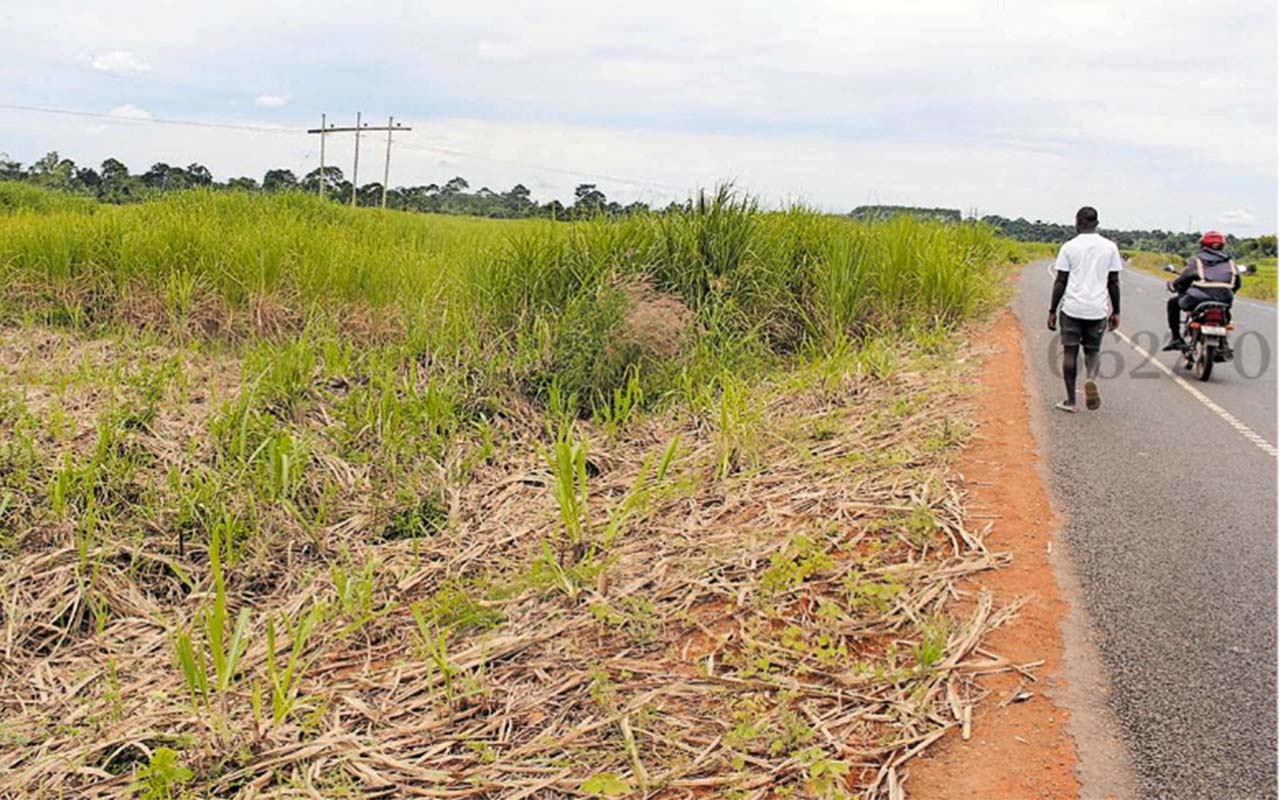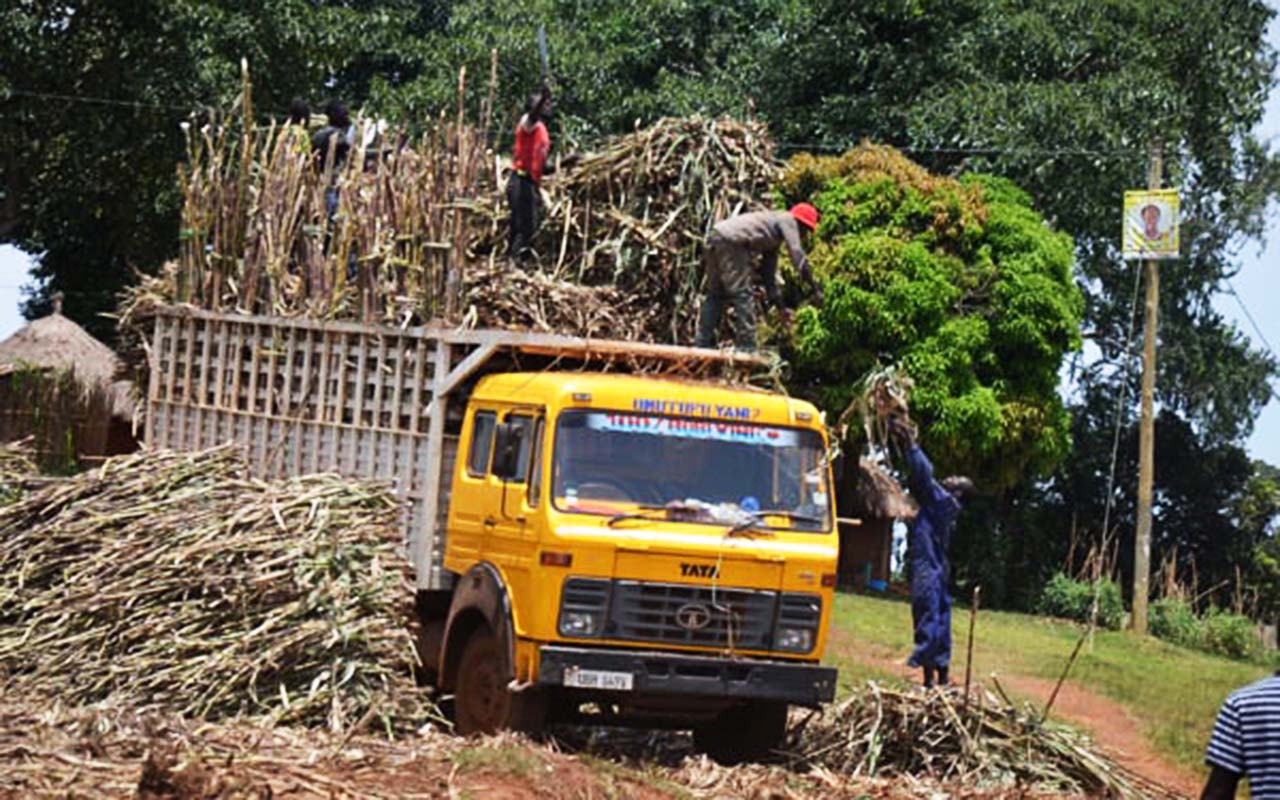Sugarcane growing wiping out Kayunga's forest cover

A man passes by a cane plantation in Kabumbuzi wetland in Busaana sub-county, Kayunga District. Photo/Fred Muzaale
What you need to know:
- Sugarcane is normally harvested at once, leaving vast tracts of land exposed to direct sun rays and soil erosion. Muramuzi says that the benefits from trees are much higher than those from planting cane.
Today, sugarcane is the world’s largest cash crop. It is used for the production of sugar, jaggery, ethanol, molasses, spirits and soda. For the past 14 years, sugarcane has been one of the main cash crops grown in Kayunga district as Fred Muzaale writes.
Sugarcane growing has created odd jobs in Kayunga district such as, cutting and loading cane on trucks, weeding and driving trucks, easing the burden of unemployment. A number of trading centres along the Kayunga-Galiraaya road such as Kitwe, Kitimbwa and Bbaale where plantation workers stay and truck drivers rest have all developed very fast.
Although the crop is grown in almost all the nine sub-counties and five town councils in the district, the scale on which it is being grown in the semi-arid Bbaale county is huge.
The county is home to Kiwula, Bajjo, and Wamale central forest reserves. The introduction of cane growing has had a negative impact on the forest cover, both in the central forest reserves and on private land.
Moses Muhumuza, the head of legal and corporate affairs at National Forestry Authority (NFA), estimates that a total of 3,640 hectares out of the 7,470 hectares of the central forest reserves in Bbaale county have been destroyed to give way to cane growing. “Wealthy individuals have used their influence to obtain land titles in the forest reserves.
They then sell the land titles to sugar manufacturing companies such as SCOUL, GM Sugar, Madhivani, and others.
The owners of those companies are untouchable,” Muhumuza says.

Sugarcane being loaded into a truck in Jinja District in 2021. Experts have again weighed in on why Busoga Sub-region is still poverty-stricken despite engaging in sugarcane growing. PHOTO/FILE
Thirty percent of Bajjo forest, 80 percent of Wamale forest, and 50 percent of Kiwula forest is now under cane growing. “Although the process of acquiring a land title requires that area land committees conduct public hearings, none of these processes are followed. The degraded forest reserves acted as catchment areas for River Ssezibwa and River Nile. They were also habitats for animals and bird,s and the source of streams,” Muhumuza explains.
The streams have since dried up and floodwater from Lake Kyoga is causing destruction to the livelihoods and displacing over 6,000 residents.
“The fertilisers used in the sugarcane plantations are washed into the water sources making them unsafe for domestic use. We are now engaged in court proceedings against the sugar companies to recover that land. Eviction and restoration orders have been issued to the degraders,” Muhumuza says.
Due to the high levels of degradation, NFA is engaging communities living adjacent to the forests to plant trees. The Authority has also lodged complaints with the Ministry of Lands to cancel the illegal land titles.

A man passes by a cane plantation in Kabumbuzi wetland in Busaana sub-county, Kayunga District. Photo/Fred Muzaale
Frank Muramuzi, the executive director of the National Association of Professional Environmentalists (NAPE), is worried about the diverse effects that will come of people degrading the environment.
“Trees breathe in carbon dioxide and breathe out oxygen. Grasses like sugarcane cannot absorb much carbon dioxide from the environment like the trees. Natural trees tolerate other diversity like animals and insects which cannot live in sugarcane,” he says.

A truck transports sugarcane in Jinja City. PHOTO/TAUSI NAKATO
In addition, sugarcane is normally harvested at once, leaving vast tracts of land exposed to direct sun rays and soil erosion. Muramuzi adds that the benefits from trees are much higher than those from planting cane.
"If there was a lot of money and other benefits in growing sugarcane, farmers in Busoga sub-region would not be living in abject poverty. Deforestation and encroachment on wetlands is finally going to result in climate change and exacerbate the already bad climate conditions in that cattle-corridor area of Kayunga district, " he remarks.
Planting trees with cane
James Murenzi, a manager at GM Sugar, dismissed the claims that they are untouchable when it comes to enforcing environmental protection laws. However, he declined to speak about concerns that they have encroached on forest reserves to grow cane.

Sugarcane cut in Kabumbuzi wetland in Busaana sub-county, Kayunga District. Photo/Fred Muzaale
Wilberforce Mubiru, an administrator with the Lugazi-based SCOUL, said as a company, they have tried to plant trees on the boundaries of their sugarcane plantations."We know how important trees are to the environment. They also serve as windbreakers for our sugarcane not to be destroyed. We are sensitising our out growers in the need to plant trees. However, it is not easy to convince them to switch from cane to tree planting,” he says.
However, Maimuna Nantabo, the Kayunga district environment officer, says despite numerous engagements, the district’s efforts to order sugar companies to plant trees on the boundaries of their plantations have not been heeded to.
"We have made reports about these sugar companies to the Ministry of Water and Environment but nothing has been done. They are untouchable, and because of their example, we are facing challenges in evicting farmers cultivating in wetlands, who accuse us of selectively applying the law,” she says.
Nantabo adds that in order to acquire land, the sugar investors make promises to turn around the livelihoods of the population, which she says has not materialised.
With more residents taking on cane growing, currently, there are 422 registered farmers Kayunga Sugarcane Out growers Society.
Badru Ssentongo, the society's treasurer, says members are being sensitised on the need to plant trees around their plantations.“The trees conserve the environment and are also a source of wood fuel. Naturally, farmers cut trees on sugar plantations because the trees affect the normal growth of the crop.
But we are encouraging them to plant trees on the plantation boundaries,” he says.
Other negative impactsBesides environmental degradation, Charles Tebandeke, the Bbaale County Member of Parliament, says sugarcane growing has caused land wrangles because it has increased the value and cost of the land in the area.
"Land is expensive and men who want quick money are selling off their land, without consent from their spouses. This has resulted in domestic violence. The plantations have also become a source of insecurity with criminals using them as hideouts," Tebandeke notes.
Before the advent of sugar plantations, an acre of land in Bbaale County was priced at Shs500,000. Now, it is Shs5 million. Statistics from the Uganda Police Force show that Bbaale County registers the highest number of crimes, among them, murder, land grabbing, assault, burglary and food theft.
Residents theorise that the cause of the high rate of crime could be that sugarcane companies ferry unemployed youths into the area to work on the plantations, who eventually resort to criminality to survive.
Because sugarcane growing is a lucrative enterprise, Tebandeke says some locals have abandoned food crops. Being a mono crop, in areas where cane is grown, all the land is occupied with cane.
“Most of the residents have to spend most of their income on buying food and this has increased the household poverty levels. Additionally, child labour in the area has increased since young boys are the ones who cut cane and load it onto the trucks,” he says.
Many adolescents have dropped out of school in the area because of the quick gains to be made from cutting cane from the fields.
Dan Bubaale, the district education officer, says Kayunga has a 3.2 percent school dropout rate, which is high.
"We are working with local leaders and the police to fight the vise. We usually carry out operations to arrest children we find in sugarcane plantations during school time," the official says.
Andrew Muwonge, the LCV chairperson, says the heavy trucks ferrying cane from the plantations are ruining the district’s marrum roads.
“The roads are developing pot holes and becoming impassable, and because of this, the cost of maintaining them has increased. More often than not, we have to carry out emergency renovations. Since the government gets a lot of taxes from sugar manufacturing companies, we should be considered for a special grant to work on these roads," he says.
The Kayunga-Galilaaya road has become a death trap for its users because it is narrow and in a sorry state. As a result, a number of people have been knocked dead.
Sugarcane growing has greatly affected food security in the district. Dr Charles Iga, the district production officer, says, this is because many small-scale farmers are now out growers.
“We are now receiving complaints of food theft from people in Bbaale County. Some residents, in order to cope with food insecurity, have resorted to offering labour in exchange for food. The district council plans to pass an ordinance which will bar people with small plots of land from growing cane,” he says.
There are signs that a new sugar factory will be constructed in Kaazi village in Kayunga sub-county. This is likely to further escalate the already dire situation as more residents will abandon other enterprises and go into sugarcane growing.
Produced by Nation Media Group in partnership with the Bill & Melinda Gates Foundation. General Manager Editorial Daniel Kalinaki. Weekend Editor Robert Madoi. Sustainability Hub Editor Gillian Nantume
Features Editor Caesar Karuhanga Abangirah



